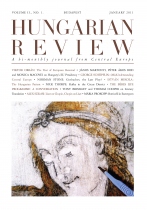MANDELSHTAM’S ETERNITIES TRANSLATED INTO THE AMERICAN IDIOM
MANDELSHTAM’S ETERNITIES TRANSLATED INTO THE AMERICAN IDIOM
Author(s): Tony BrinkleySubject(s): Literary Texts
Published by: BL Nonprofit Kft
Summary/Abstract: Sometimes there is nowhere else to turn but to eternity, to a present that will not become past. Mandelshtam’s Voronezh Notebooks are such a powerful statement of their time and place that it is sometimes easy to forget that they are not only of their time and place, that Mandelshtam’s uncanny power which may have even intrigued Stalin with its mastery involved a politically dangerous excess, his inability to be only a Stalinist or a Soviet or even a Russian poet. Marina Tsvetaeva, for a brief time Mandelshtam’s friend and lover, wrote to Rilke in 1926 that she did not “understand why people speak of French, Russian, etc., poets”: “I am not a Russian poet and am always puzzled when I am seen as one. This is just why one becomes a poet... in order not to be French, Russian, etc.” In a similar spirit, one might say that Mandelshtam wrote poetry during his internal exile in Voronezh (Summer 1934 – Spring 1937) so that he would not be of his time – not only in exile in Voronezh. In 1933, he had written of Dante that “it is inconceivable to read Dante’s cantos without directing them toward the present [sovremennosti]. They were created for that purpose,” for a “present-day [that] is continuous, incalculable and inexhaustible,” a presentness, one might add, that also enabled Dante to escape the Italy of his time which has now been relegated to footnotes.
Journal: Hungarian Review
- Issue Year: II/2011
- Issue No: 01
- Page Range: 109-117
- Page Count: 9
- Language: English

